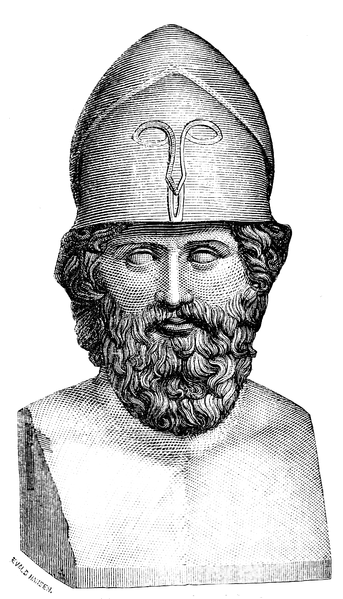While the Greco-Persian wars have remained a topic of sincere interest for those of us who study the ancients, it can be said that an undo amount of attention has been paid to particular engagements… while the rest of history has remained obscure. The Spartans and their heroic stand at Thermopylae captured the imagination of modern society and spawned several recreations in popular media. The Spartans were lucky enough to have two films and a graphic novel created in their honor, even if they did have to prance around in leather speedos.
However, perhaps we should also remember what happened after Thermopylae. The Persian invaders certainly didn’t throw down their weapons and send 100,000 men home. In fact, they continued their march through Greece, perhaps stepping gingerly over the fresh corpses of Leonidas and his men. And if it weren’t for the steeled determination of the Greeks to repel the invaders, they might have conquered the entire known world.
At the front of the Greek forces was one Athenian general who had risen from poverty to power. It can be said that ancient Greece owed much thanks to the brave Themistocles.
The Greek historian Herodotus as well as the Roman essayist, Plutarch, wrote extensively about the life and achievements of Themistocles. The first interesting thing about Themistocles was that he was not born into wealth. Themistocles was the son of Neocles, a very obscure Athenian citizen of modest means. His mother was believed to have been an immigrant, and not much else is really known about the early life of Themistocles. However Plutarch tells that he grew up as an outsider, living in an immigrant district of Athens, never really being accepted by the other Athenian children.
It was claimed by Plutarch that he was a voracious learner. While other children were playing, Themistocles committed himself to his studies and training. As a child, he was so intent on improving himself that his teachers would regularly tell him:
“You, my boy, will be nothing insignificant, but great one way or another, either for good or for evil.” -Plutarch, from “Themistocles”
Themistocles grew up during a time of societal upheaval in ancient Athens. There had previously been several years of unstable rule by various leaders including the tyrant Peisistratos, who died in 527 BCE. After several failed rulers, Athens eventually resorted to a new form of government, one where the power would be invested in the people. It was the beginning of democracy, and Themistocles was poised to be its first great politician.
Themistocles gained popularity in Athens by painting himself as a man of the people. He campaigned in the streets of Athens the way nobody had ever done before. He toured the taverns and docks and met with the underprivileged citizens who had now been granted the right to vote for their leader. Themistocles took care to remember people’s names and he courted and took interest in the commoners. And for this, they loved him. The modern historian Tom Holland, writes about Themistocles in his book Persian Fire:
“he wooed the poor; and they, not used to being courted, duly loved him back. Touring the taverns, the markets, the docks, canvassing where no politician had thought to canvas before, making sure never to forget a single voter’s name, Themistocles had set his eyes on a radical new constituency” -Tom Holland, Persian Fire
The popularity of Themistocles would grant him great influence in the new democratic Athens. By the time he was 30 he was elected Archon Eponymous, the highest government office in Athens. He would use his political influence to pursue his goal of expanding the Athenian navy. In addition to being a brilliant speaker, politician and statesman, Themistocles also possessed the gift of foresight. A second Persian invasion was imminent, and Themistocles was determined to be prepared.
continue reading here










2 comments
I love the History of Greece. People work hard to get what they wanted. When Democracy came from greece to all the People around the world. They made it guide people wath there rule of Law. Now we have government want to rule the people. Like USA has a radical President that been studing Saul Alensky Rules 12 of the radical bull. We The People believe this well change in a matter of time. We need Less Government and more people speaking out for there Freedom and not government run agency and Democrat lies and Agenda of this Lousy President Obama. He need to be Impeach no matter what. He is not a US citizen to take the Oath of Office Period. Born in Kenyen and we all have profe of all this. Supreme court is a lame duck. They need to wake up and Listen to the People not the political parties. I pray every day that this president goes away Period. Thank you for the Greek History. Be Bless you all. Constantine Kalambokias.
Ploutarchos was Greek
Trackbacks
Our apologies, you must be logged in to post a comment.